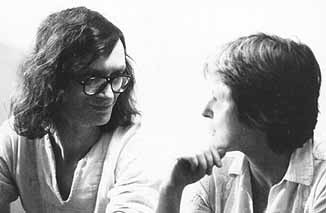Australian poet Martin Johnston, 1947-90
Twelve pieces, in Jacket 1 and Jacket 11

A note from John Tranter: The Australian poet Martin Johnston was one of a generation of poets who invigorated Australian poetry in the late 1960s and 1970s. His contribution was unusual: he had a European upbringing, having spent fourteen years of his childhood abroad, in England and Greece. Martin died in June 1990 at the age of forty-two. Over the next two years I compiled a selection of most of his published poetry, essays and book reviews together with some interviews and photographs, and Martin Johnston — Selected Poems and Prose was published by the University of Queensland Press in 1993. A large number of Martin’s poems and prose writings are available in Jacket 1, together with some photographs, and another large tranche in Jacket 11, all linked to from the items below.
In Jacket 01:
The main part of my Introduction to the Selected Poems and Prose
A group of sonnets, In Transit — a Sonnet Square
An essay on Jorge Luis Borges
Five late poems
Translations of Greek folk songs
Some photographs of Martin when young
in Jacket 11:
Martin Johnston — poem sequence — “Microclimatology”
Martin Johnston on Greek Folk Poetry
Martin Johnston on the paintings of Theofilos
Petro Alexiou — A Talk on Martin Johnston
John Lucas — Martin Johnston and the matter of elegy:
“The essay is... full of remarkable insights and, for all its fragmentary nature, remains one of the best pieces of writing about Berryman I know.”
Brian Kim Stefans — A Quick Graph: On Martin Johnston — Paragraphs from an Unwritten Letter to John Tranter
Adapted from my Introduction:
Martin … might have loved John Berryman’s work and learned much from contemporary American poetry, but he had also read Cavafy and Seferis in their native Greek years before, and had immersed himself in Homer as a child. He also worked as a cadet reporter, a freelancer book reviewer and a subeditor and subtitler of television programs. He travelled to Europe many times, returning to Greece to live for some years, and exploring France, Italy and Germany as well as the British Isles. He had a strong sense of political engagement as well as an appetite for esoteric philosophies and complex cultural detail, and all this material helped to form his thinking and his practice as a writer, though he was not a remote intellectual in any sense. He enjoyed literary conversation, but he was just as happy talking with old fishermen in a Greek village taverna.
Under the horizon